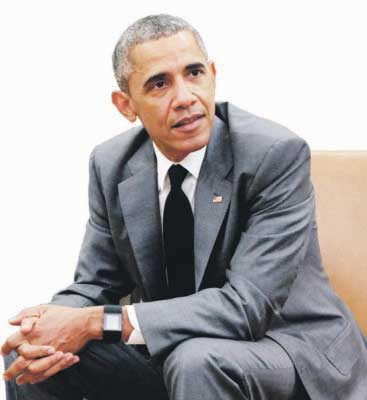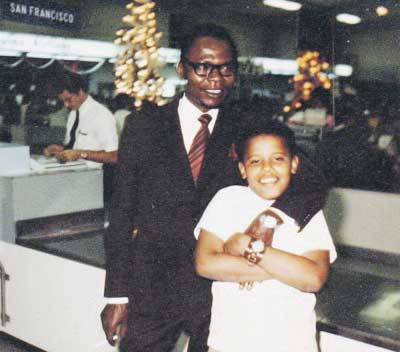WASHINGTON — President Obama is defined in many ways by something he never really had.
A father.
He quizzes golf partners and friends about their dads. He leans in when he talks with troubled teens about the absence of a father in his own life. The loss shapes his role as a father and drives him to try to help others escape what a close friend calls “the voids in your life.”
His late father, thus, looms large when Obama visits Kenya next week for the first time as president. He may not visit the village where his father lived. He may not go to see the grave site freshly decorated just in case. But his Kenyan father will be very much on his mind, as always.
The father Obama scarcely knew was born in Kenya in 1936 and died there, mostly a stranger to his son, whom he left as an infant. But there’s little doubt that Obama has been indelibly shaped by the vacuum.
“It motivated him to want to do better,” said Valerie Jarrett, a close friend and Obama’s senior White House adviser. “His message to young people is you don’t have to be defined by the voids in your life.”
Obama points to his father and his unrealized potential – he died at 46 – as a source of his ambition. “Every man is trying to either live up to his father’s expectations or make up for his father’s mistakes. And I suppose that may explain my particular malady,” he wrote in his 2006 book, “The Audacity of Hope.”
Now Obama returns to his father’s homeland, his ambition elevating his family in one generation from a tiny village in Kenya to the White House.
The elder Barack Obama came to the United States in 1960, part of a scholarship program to educate young Africans eager to slip the bonds of British colonial rule. He met Obama’s mother, Stanley Ann Dunham, a white woman from Kansas, at the University of Hawaii in 1960. They married and welcomed a son, born in Honolulu in August 1961.
The senior Obama left when the future president was 2, heading to Harvard University and then to Kenya. His son, raised by his mother and her parents in Hawaii and Indonesia, would see his father just once more, for a month. He was 10.
Brilliant but troubled, the elder Obama became an economist in Kenya, which gained independence in 1963. After early promise, his life “ended up being filled with disappointments,” the younger Obama has said. A descent into alcoholism ended with a fatal car crash in Nairobi in 1982.
Obama made his first pilgrimage to Kenya in 1987, seeking to reconcile his own racial identity as he searched for an understanding of his father.
Though his mother spoke positively of his father, Obama found his story more complicated. His father had children with several wives, was an alcoholic and a womanizer who “did not treat his children well,” Obama told Newsweek in 2008.
This trip, built around a summit in Nairobi and meetings with Kenyan officials, will be Obama’s fourth to the country. Expectations are considerable: The government plans to spend 1 million Kenyan shillings – about $16,000 – to spruce up his father’s and grandfather’s graves in the family’s village of Kogelo, a seven-hour drive from Nairobi, according to The Star newspaper.
“Kenyans don’t think of (Obama) as African-American, they think of him as Kenyan-American,” EJ Hogendoorn, deputy program director for Africa at the International Crisis Group, said at a Washington briefing on Obama’s trip. “They think of him as Luo-American,” a reference to his Obama’s father’s and grandfather’s tribal roots.
It’s unclear whether Obama will visit the remote town as he did on previous trips, or meet with family members who include aunts, uncles, step-siblings and his Kenyan step-grandmother, known as Mama Sarah.
The third wife of Obama’s paternal grandfather, Mama Sarah lives in Kogelo and has asked Obama to visit “to pay respect to his father’s grave,” AFP reported.
She’s vowed to cook a traditional Kenyan meal for her grandson: “It does not matter whether Barack is a senator or a president,” she said. “He will have what I have prepared for him.”
Though not related by blood, Obama called Mama Sarah “Granny” in the memoir that resulted from his first trip, “Dreams From My Father.” Published in 1995, the book would serve as a source for voters wanting to understand Obama’s heritage, and as fodder for conspiracy theorists who sought to portray Obama as foreign born.
Obama said a bit wistfully this week that visiting Kenya as a private citizen was “probably more meaningful to me than visiting as president, because I can actually get outside of the hotel room or a conference center.”
Obama said he hopes the visit, beyond being “symbolically important,” demonstrates that the U.S. sees itself as a partner with Kenya and other sub-Saharan countries.
He said he expects a focus on counterterrorism efforts as the Somalia-based terrorist group, al Shabaab, continues to threaten Kenya and neighboring countries, including Ethiopia, where Obama also will visit.
Obama said he plans to address corruption in Kenya, which ranks as one of the most corrupt countries in the world, placing 145 out of 175 on Transparency International’s corruption index. The U.S. wants to “continue to encourage democracy and the reduction of corruption inside that country that sometimes has held back this incredibly gifted and blessed country,” he said.
Obama used his heritage to launch his national political profile, depicting himself as a bridge to the future.
At the 2004 Democratic National Convention, he invoked his father’s legacy as a foreign student who saw America as a “beacon of freedom and opportunity” in a soaring keynote address that put him on the national stage.
On the campaign trail in 2007, Obama cited his father when an Iowa voter asked him what experience had prepared him to make critical decisions.
What his father’s absence meant, Obama said, “was that I had to learn very early on to figure out what was important and what wasn’t, and exercise my own judgment.”
As president, Obama has spoken candidly about growing up without a father, saying he’s made an extra effort “to be a good dad for my own children.”
He’s admitted to drug use in high school and warned that children who grow up without a father are more likely to live in poverty, drop out of school, end up in prison or abuse drugs and alcohol.
“I say all this as someone who grew up without a father in my own life,” Obama said at a Father’s Day event at the White House in 2010, calling it “something that leaves a hole in a child’s life.”
Obama’s remarks on fatherhood and responsibility, often aimed at African-Americans, have not always been well received.
The Rev. Jesse Jackson charged in 2008 that Obama was “talking down” to African-Americans. Essayist Ta-Nehisi Coates accused Obama in a 2013 Atlantic magazine piece of being tougher on black audiences than white, calling him “singularly the scold of ‘black America.’ ”
Obama makes no apologies.
“I am a black man who grew up without a father and I know the cost that I paid for that,” he said in May at a poverty summit. “I also know that I have the capacity to break that cycle, and as a consequence, I think my daughters are better off.”
That same month he announced he would make permanent the My Brother’s Keeper initiative he launched in the wake of several racially charged deaths of young men.
“A mission for me and for (first lady Michelle Obama) not just for the rest of my presidency, but for the rest of my life,” he said.
“The reason is simple,” Obama said. “I grew up without a dad. I grew up lost and sometimes adrift, not having a sense of a clear path.”
Obama shared his experience in February with Noah McQueen, a Maryland high school student who told Obama he didn’t have “much of a relationship” with his father and landed in juvenile detention before pulling his life together.
“I didn’t get in trouble with the law, but either way we ended in a similar place,” Obama said in the interview for the oral history project, Story Corps. He told McQueen he’d faced “some of the same struggles” stemming from his father’s absence.
But, he added, “at some point, you have to take responsibility for yourself and realize no matter what the circumstances are, you have the ability to make positive decisions.”
In Chicago in 2013, he sat in a circle with a group of at-risk boys, who gaped as he talked about growing up fatherless, being angry and smoking marijuana.
“A couple of the youth were like, ‘Are you talking about you?’ ” said Anthony DiVittorio, founder of the Youth Guidance B.A.M. (Becoming a Man) program.
Obama has sought to turn friends into advocates, surprising some by asking about their fathers. He and Rep. James Clyburn, D-S.C., were golfing on Martha’s Vineyard in 2010 when Obama asked about Clyburn’s parents, “especially your father.”
He and Transportation Secretary Anthony Foxx were traveling together when Obama stopped the conversation, asking Foxx to “tell me about your father,” Foxx said at a My Brother’s Keeper summit last November. Obama said the two “shared that sense of both how hard that had been, but also how that had driven us to succeed in many ways.”
Foxx, who said he has struggled with “how much of my own private story to share publicly,” told Obama that his mother was a 19-year-old college sophomore when he was born and that he’d lived with his grandparents when he was growing up.
“As we got to talking more and more, we ended the conversation by saying we had to tell our story,” Foxx said. Too many young men of color believe “that they are living the life that no one else is living, walking pathways that no one else is walking.”
Send questions/comments to the editors.




Success. Please wait for the page to reload. If the page does not reload within 5 seconds, please refresh the page.
Enter your email and password to access comments.
Hi, to comment on stories you must . This profile is in addition to your subscription and website login.
Already have a commenting profile? .
Invalid username/password.
Please check your email to confirm and complete your registration.
Only subscribers are eligible to post comments. Please subscribe or login first for digital access. Here’s why.
Use the form below to reset your password. When you've submitted your account email, we will send an email with a reset code.